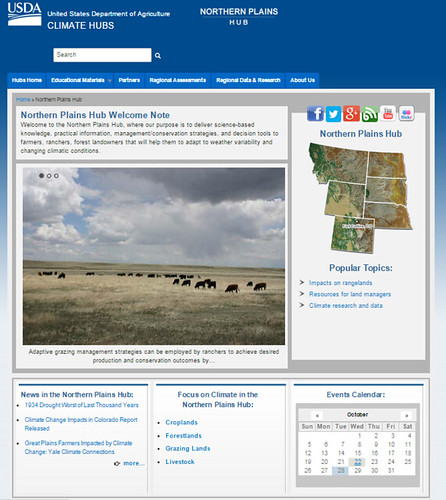
The new Climate Hubs Northern Plains website provides producers with science-based information.
This fall, ranchers, farmers, and land managers in the Northern Plains from Bartlett, Nebraska to the Wind River Indian Reservation in Wyoming will be making decisions that will affect their operations in the coming year. Land managers often consider markets, weather and changing climatic conditions using data and information from various sources including newspapers and popular press publications, Cooperative Extension agents, State Climatologists, and the Internet.
With the recent launch of the USDA Northern Plains Regional Climate Hub website, ranchers, farmers, and land managers have a new source for region-specific, science-based information, practical management and conservation strategies, and decision-support tools. The national Hubs site features links to the latest climate news, events, thematic climate highlights (e.g. Croplands, Forestland, Grazing Lands and Livestock) as well as educational materials, factsheets, and regional contact information.
The collaborative efforts of the USDA Northern Plains Regional Climate Hub encompass agencies both within and outside of USDA. The Northern Plains hub is located at the Agricultural Research Service Plains Area Office in Fort Collins, Colorado and key partners include the USDA National Agroforestry Center, Cooperative Extension at the University of Wyoming, Colorado State University, University of Nebraska-Lincoln, South Dakota State University, North Dakota State University, and Montana State University. The hub is undertaking educational curriculum development with Wyoming Agriculture in the Classroom, and closely coordinating with the North Central Climate Science Center, the National Drought Mitigation Center, the National Integrated Drought Information System, the High Plains Regional Climate Center, and Western Water Assessment.
To find out more, visit the Northern Plains Website, or contact us!
No comments:
Post a Comment
Note: Only a member of this blog may post a comment.